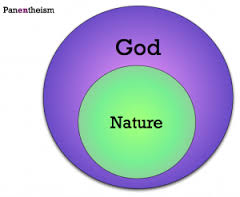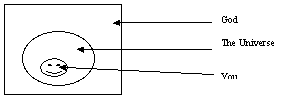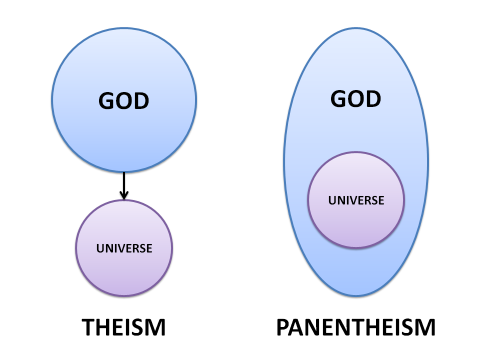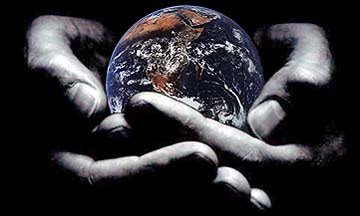Personally, when I consider the sheer vastness of the universe and how big it truly is, what amazes me even more is the entire concept of multiple heavens.....that there are levels and the Lord is truly outside of it all.
If you remember the film "Men in Black", there was a famous scene that really brought things into perspective on the issue of things would look like in the eyes of a creator:
Of course, I don't think the Lord looks like how the alien being looked like in 'Men in Black"


. But on a serious level, I do think that there's something to be said on how the classical model of how we see the universe isn't enough...for the Lord sustains it and is OUTSIDE of it entirely. The entire view behind what's known as Panentheism. Although I tend to favor other views, Panentheism has always seemed to be the most reasonable way of seeing things since the Lord is distinct from creation--sustaining it---and yet He is outside of it. Panentheism deals with how all there is not only emanates from God..but is experienced by Him as well. Its the idea that ones not to worship an animal or a tree since its not the creatorbut on the same token, as Chasidism ascribes to, the animal being abused is felt deeply by the Lord. He hurts with it as much as it does since that creation is directly connected to Him (As its being sustained by Him) and consequently He can feel itjust as he does with all suffering and pain in the world whenever injustice occurs (more shared here in #
1, #
91 and #
92 ).
Its by His Grace that all men have rain....for in his Providential Grace, He shows grace/care for all his creatures...allowing others to survive by sending rain on the JUST and the Unjust (Matthew 5:45)....and Christ in the scriptures is portrayed as the INSTRUMENT of creation, "sustaining all things by His powerful word", (Colosians 1:16-7, John 1:3, Hebrews 1:3)---and whom by immanence is fully present in even the smallest atom....with all things connected to Him
Panentheism is the idea that the entire universe is part of God, But God is greater that the universe. God is omnipresent and transcendent that is, God contains the entire cosmos but the entire cosmos does not and cannot contain God. He is omnipresent because his uncreated energies permeate all Creation, generating and sustaining it. And He is transcendent because his uncreated essence is inaccessible to us it is wholly beyond Creation.
Kinda like my cells and molecules and blood and other things in my body are part of myself, but I am much greater than those
and I cannot be seen in them
.yet I am omnipresent through them, as I created them at my conception and sustain them throughout my life. God transcends creation as I transcend my body. Intelligence is everywhere.
I personally see no issue with supporting Biblical Panentheism and the concept of God being outside of the world and yet connected deeply to it/all within
Panentheism does not begin soteriologically with Gods special presence to some but with the universal presence to all, moving from thence toward the theories of special presence. It seeks to give the right perspective & focus in the face of evil. For instead of pulling away from those things that do not now manifest the nature of God fully, panentheism suggests the picture of transforming and healing them, as a healthy body might heal itself from an injury.
In this line of thought, the rapist still is being sustained by the Lords power even though God may not approve of His actions/decide to dwell with him
with Gods heart being to see the rapists REDEEMED and trusting in Him since even the Rapists was made in the image of God/given as aspect of the Divine
.and the message of repentence/forgiveness and grace is where that process of healing can begin for the rapist, the murderer or any other aspect where decline has begun.
Even though in some ways He chooses to be disconnected from it, he is still connected to it intimately. The same goes for what was noted earlier when it comes to decline in the natural world, especially in cases where the natural world has been raped. Panentheism would suggest that God desires for healing to occur rather than the world to be abandoned altogether/demolished
.and thus, He keeps it all going so that the chance for healing/redeemption may occur.
Panentheism ALSO deals with how all there is not only emanates from God..
but is experienced by Him as well. Its the idea that ones not to worship an animal or a tree since its not the creatorbut on the same token, as Chasidism ascribes to, the anima
l being abused is felt deeply by the Lord. He hurts with it as much as it does since that creation is directly connected to Him (As its being sustained by Him) and consequently He can feel itjust as he does with all suffering and pain in the world whenever injustice occurs.
Christ said that even the sparrows do not fall outside of Gods careas well as why He made clear that even the Ravens look to God for food (
Psalm 104:18-22,
Psalm 147:8-10,
Matthew 6:25-27,
Luke 12:23-25 etc )
This is why many Panentheist have noted that Paul made a point in Romans to discuss how its not just humankind thats redeemed
but all of creation as well, described as groaning and suffering rather than being indifferent to it all. The Eastern Fathers and some medievals have written profoundly on the cosmic dimensions of the Incarnation and Redemption (as did St. Paul).
Classical theism views sin and the Fall as distinct from the basic structure of the world and the culmination of the kingdom of God as a gracious undertaking that is not a mere outcome of a natural process. Panentheism, however, typically views creation and the Fall as part of the cosmic process as are redemption and consummation.
Christian panentheists view the earthly existence of Jesus Christ as either the central cause of the outcome of the process or a primary symbol or example of the process. Each approach is at odds with classical theism. With Biblical Panentheism I tend to lean more so toward whats known as weak panentheism or soteriological panentheism. That is more similar to the position found in Eastern Orthodox Christianity (As well as Eastern Christianity in general). For in that view, God is manifest in redeemed nature and panentheistic metaphors are used in an eschatological sense, a future expectation when all redeemed nature is reconciled with God (
1 Cor 15:28).
Ultimate salvation is viewed in a Johannine fashion, as participating in the Divine community of the Trinity (
John 14:20) and abiding in Gods love as God himself is love in that He is the eternal community between Father, Son and Holy Spirit (
1 John 4:16). If remembering the Eastern Orthodox concept known as Theosis, it helps things make more sense..
When understanding the theological framework of Panentheism as God being the system of systems, all creation and processes being within God, things can come together. You & all of creation exist within God. As for evil, that probably falls in under panentheisms understanding & of the whole creation and the sustaining of it as an act of Kenosis (self-emptying for those unfamiliar with the term, famous from
Philippians 2:7 where Christ is described taking the form of a servant by emptying himself) for God. For all of creation/ its sustaining is understood as a continuous act of suffering love, where God takes the suffering of this world upon Himself.
Noticeably, this goes counter to the more traditional understanding of the impassibility of God the Father and inability to hurt Him. The panentheistic model seems to be the more biblical of all options since God certainly is portrayed as one who is affected by the state of his creation in the scripture
.and in my view, it increases the GLORY of Gods redeemption since in Christ (Colossians 1-2), that redeemption has begun to occur over all creation and the suffering the Lord has had to endure will eventually come to a Glorious end.
Saint Gregory Palamas , and many others held all things are sustained by the energies of God . By the act of creation ( the energy ) of God the cosmos , humans , ect , are sustained by His energy .
Gxg (G²);60269236 said:
Panentheists make a qualitative, not quantitative distinction between God and the universe. Their position is very much like the idea of Divine Personalism, espoused as far back as the Book of the Wisdom of Solomon. In order to have a full view, there are different models you have to use simultaneously to capture what panentheists are talking about. One is a mother/womb analogy and another is a mind/body analogy. Gods character is perfectly good, and that character conditions the universe but doesnt determine it. We can distinguish between the mind and the body without thinking them completely separate. A womb is within a mother, but we can make a distinction between a mother and the womb she contains. (What happens to the baby doesnt necessarily happen to the mother, though it affects the mother).
By the logic of many against Panentheism, if a person has cancer that cancer somehow becomes reflective of that persons character, or implies that a person doesnt have control over who they are as a person. IMHO, Gods mind and Spirit remain the ground of all that is good, and beautiful and ordered for that matter, even if it is true that the physical universe fails to perfectly reflect that goodness, or beauty, or order. God and the universe, for the panentheist do not form an UNDIFFERENTIATED unity.
In some ways, one could also see some descriptions of panentheism to be a description of "occasionalism", which posits that Theos is the sustaining cause of each and every moment of the cosmos' existence, as if the Theos were in fact creating the cosmos at each, smallest unit of time.
After reading this thread, I can't get the song "He's got the whole world in His hands ..." out of my head

Gxg (G²);60269247 said:
One of the most powerful songs in existence....and so glad I was taught it when I was younger

.
Amazed seeing the amount of people truly impacted by that song, as I was taught it when I was younger and attending Catholic Elementary school:








